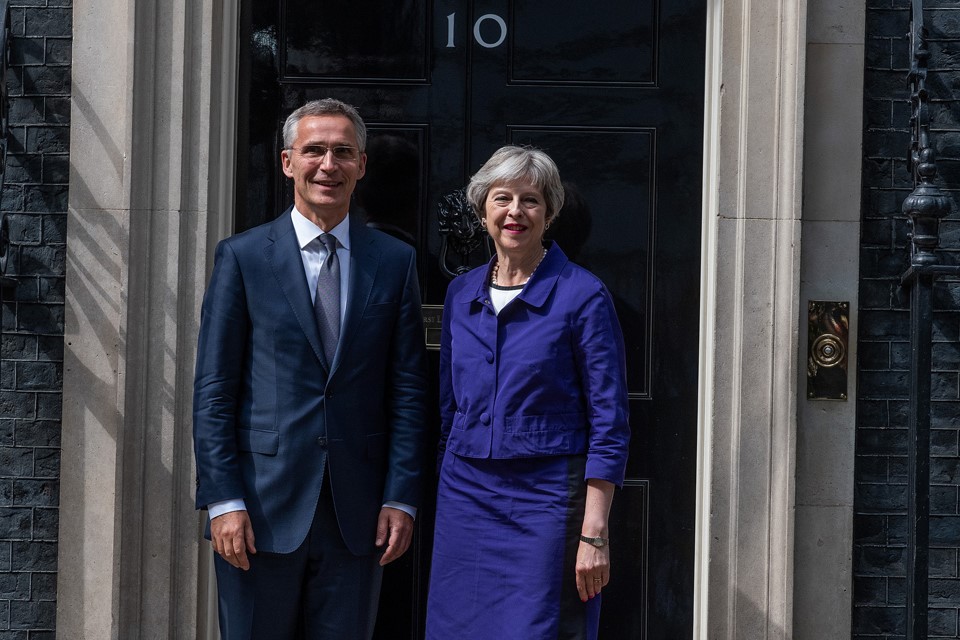PM statement at press conference with NATO Secretary-General Jens Stoltenberg: 21 June 2018
Prime Minister Theresa May’s statement at the press conference with NATO Secretary-General Jens Stoltenberg in Downing Street.

Prime Minister Theresa May:
Jens, it’s a pleasure to welcome you to Downing Street today.
The range of issues we have discussed I think underlines why NATO is as vital now as it ever has been.
And why our commitment to the Alliance remains steadfast.
Not only do we exceed the NATO target of spending 2 per cent of GDP on defence, but as we meet today thousands of our Armed Forces personnel are standing shoulder-to-shoulder with NATO allies around the world.
They serve alongside our Allies in Poland and Estonia to deter Russian aggression as part of NATO’s “enhanced Forward Presence”.
They are training and mentoring our Iraqi and Afghan partners to help them build a brighter and more prosperous future.
The Royal Navy has led half of NATO’s Standing Maritime Forces for the past year and has declared our nuclear deterrent capability to the defence of the Alliance since 1962.
And Royal Air Force Typhoon jets stationed in Romania are patrolling the skies over the Black Sea as part of NATO’s Southern Air Policing mission.
I am proud that whenever the call comes from NATO the UK is one of the first to respond.
But while we step up we cannot allow NATO to stand still.
So today the Secretary-General and I welcome the progress made on modernising NATO while recognising that there is more to do.
There has been much discussion about the need for Allies to take on greater responsibility by increasing their spending on defence and we welcome the steps that NATO Allies have taken since the Wales Summit four years ago.
Burden sharing will be one of the key items on the agenda for the Summit in July, where we will take stock of progress since the Leaders’ Meeting last May and the Warsaw and Wales Summits.
Europe is shouldering more of the burden but must continue to do more.
And as the challenges we face evolve so must we, which is why another key priority for the Summit will be making NATO more modern and adaptable.
Next month we expect to agree an ambitious package of measures to strengthen our deterrence and defence, to increase our efforts on tackling terrorism, and to address the threats presented by cyber and hybrid warfare.
Our values and our unity are the source of NATO’s strength, but as an organisation of 29 based on consensus, there is a risk that we cannot always act as quickly as our adversaries.
So it is reassuring that NATO continues to adapt to ensure that it is less bureaucratic, better at prioritising its activity, and more capable of taking and implementing decisions quickly.
This work will include improving readiness to make sure that we have the right forces in the right place so that they can act to protect our people.
The UK already plays an important part in this by supporting the design of a new NATO Command Structure – and I’m proud to say that we’ll be committing an additional 100 posts to that Structure taking our commitment to over 1000 UK Service personnel.
Finally, this is the first time that the Secretary-General and I have met since Russia’s use of an illegal nerve agent in Salisbury.
We saw a powerful demonstration of the value of the Alliance in its response to this incident and I would like to thank the Secretary General for his and for NATO’s support.
This act was the latest Russian provocation in a wider pattern of malign behaviour – cyber, disinformation, political subversion and increased military posturing.
We will continue to be at the forefront of those opposing Russia’s malign activity and the abuse of the international rules-based system, but we remain committed to the NATO approach of deterrence and defence backed up by periodic and meaningful dialogue with Russia.
The message that I have conveyed to the Secretary-General today is that the UK will continue to lead by example in NATO, meeting the 2% target on Defence spending, contributing across the board to Alliance missions and operations and continuing to encourage all Allies to do the same.